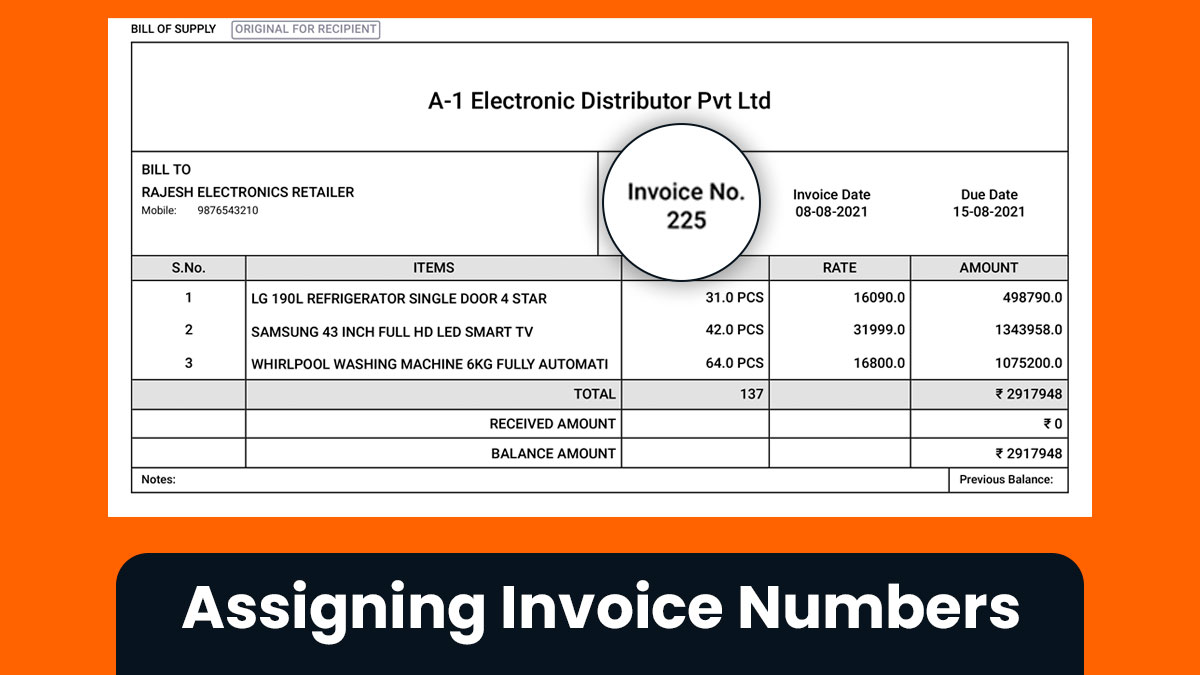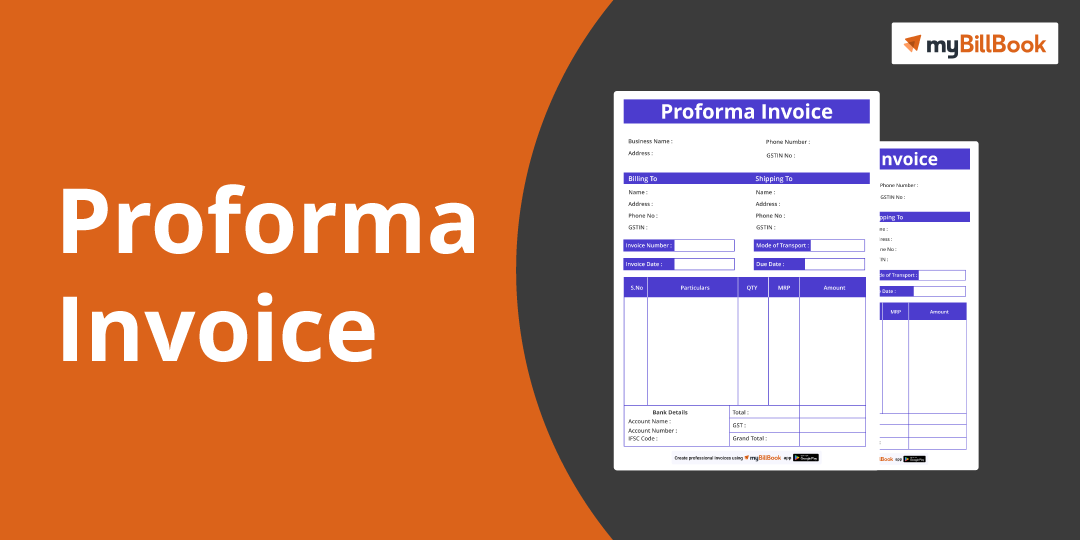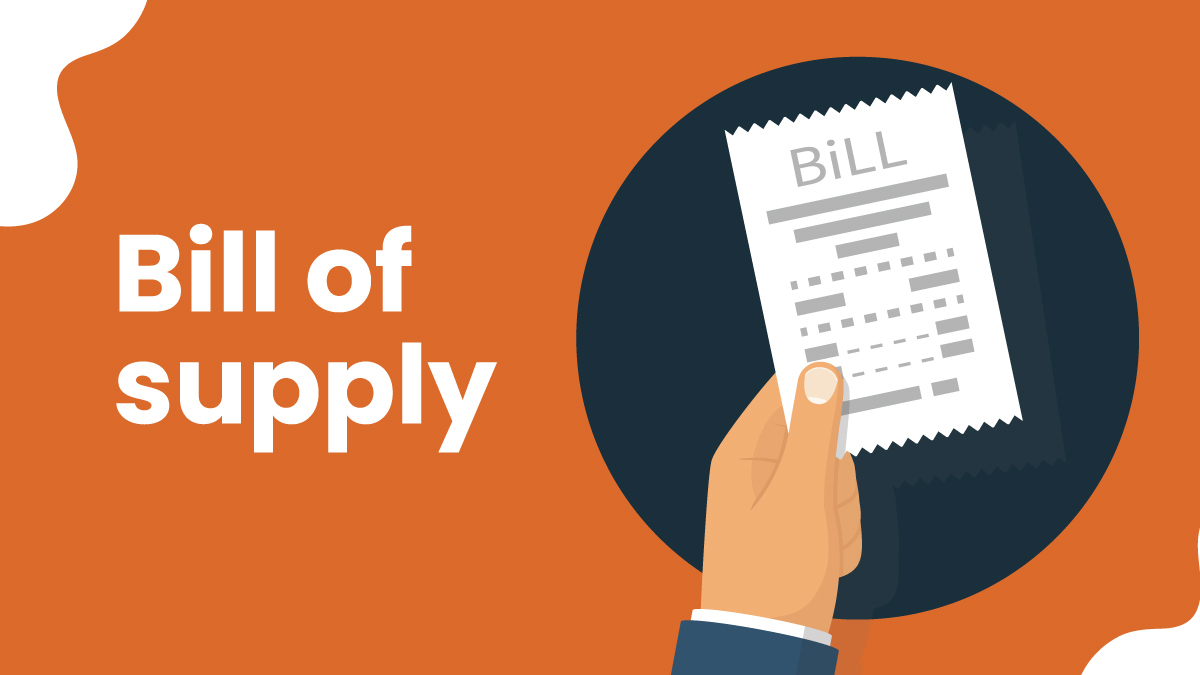What is an Invoice Number & Methods to Assign an Invoice Number
An invoice is a document which provides information about transactions between the buyer and the seller. Generally, this includes information such as the quantity of goods or services, description of goods and services, total amount due, terms of payment and date of transaction.
Whenever a business grows, it needs to send out many invoices. It’s a major problem to keep track of all these invoices. This is where the invoice numbers come in. Giving each invoice its unique number ensures that payments are tracked easily, accounts are reconciled perfectly, and the document is valid. It can be especially important for businesses that deal with large volumes of transactions since it prevents mistakes or disputes. This article delves into useful information about invoice number format and assigning invoice numbers.
What is an Invoice Number | Meaning of Invoice Number
An invoice number is a unique number assigned to invoices to make it easy to identify them, arrange them sequentially, and record their particulars. An invoice number (or simply an invoice ID) is often placed at the topmost part of an invoice, and it could be numerical or alphanumeric with special characters.
Invoice Number Format
When it comes to invoice number format, it is important to have a standard system for consistency in the invoices. The GST invoice number format should not exceed sixteen characters. It can be in one or more series consisting of letters or figures or special characters such as hyphens or dashes “-” and slashes “/” respectively and any combination thereof, which are different for every financial year. This format makes it easy to identify and track invoices in order to facilitate the payment process and make record-keeping more accurate.
Moreover, adding sequential numbers can help monitor the chronological order of invoices ensuring ease in financial management. Structured invoice no formats can help companies improve their overall accounting practices while ensuring timely and accurate processing of financial transactions.
Different Methods to Assign Invoice Numbers
As mentioned above in this article, there isn’t any single standard invoice numbering method. Every business has the right to choose the best numbering way based on their convenience. Below, you can find 4 different types of numbering formats businesses generally use.
-
Sequential Invoice Numbering
This is an invoice numbering system where the numbers move up by one with every single invoice you create. You can start with entering invoice no 1, followed by 2, 3, 4, 5, etc., for the upcoming invoice. It is also feasible to enter the invoice no as 00001, 00002, 00003, and so on. But the most common sequential invoice numbering is given as 0000000001 (9 zeros followed by the digit).
-
Chronological Invoice Numbering
The chronological method is a way to create longer and more detailed invoice numbers. In this invoice numbering system, the date on which the invoice was created is added.
For example if the invoice was generated on June 28th, 2024, the invoice would look like 20240628 – 001. The invoice no format will be YYYYMMDD-001.
In the example shown above, the first part is the date and the second part is the order number which will go up after every new transaction.
You can even use another format of the chronological system, which is DDMMYYY and MMDDYYY.
-
Project-based Invoice Numbering
This is another type of invoice numbering system used by businesses that take many on projects or for whom the project number is very important. The two ways of project numbering include the following:
project number + customer number + sequence number = ABCXYZ303- 1265-01
customer number + project number + sequence number = 1265- XYZ303-01
-
Customer Invoice Numbering
In the customer invoice numbering system, the number will begin with the customer number, followed by the date (optional), and end with the sequence number. An example of this numbering system with 4035 as a customer number on June 29th, 2024, is 4035-001 or 4035-20240629-001.
Hassle-free Invoice Numbering using Billing Software
With manual invoice numbering, you may have to deal with all the hassles in assigning invoice numbers. However, if you get billing software to manage your billing and accounting operations, the software would take care of the entire invoice numbering process. It also provides you with an option to choose your own prefix, suffix, or number format. Using billing software also makes it easy to organise and track invoices using their numbers.
Steps to Set Invoice Number Format Using myBillBook Billing Software
myBillBook can help you produce the invoice numbers automatically. Choosing your prefix and starting number is possible by enabling the toggle. See the steps given below:
- First, log in to myBillBook
- Select ‘Sales invoice’
- Click on ‘Create Sales Invoice’
- ‘Invoice prefix’ and ‘Invoice number’ fields are visible
- You can edit the ‘Invoice Prefix’ or ‘Invoice Number’
- In case if you do not want to add any prefix to the invoice number and want to remove the prefix, then click on the ‘Settings’ button at the top of the section
- Find ‘Invoice Prefix’ and ‘Sequence Number’ section
- You can disable the ‘Invoice Prefix’ using the toggle button
- Once done, click on ‘Save’
- Now, the invoice prefix field is removed
- You can add any new prefix to the invoice number
- Click on ‘Settings’ again and click the toggle button to enable invoice prefix
- Enter a new prefix and a sequence number from which you want to start
- Click on ‘Save’
- You can see the new invoice prefix and the invoice number added
- Now click on Save, and your invoice will be created with the same sequence.
Why is Invoice Number Important?
Easily track payments
Invoice numbers ease sales tracking and payment status. They are essential when managing customer accounts, especially when one customer has multiple invoices. Having an individual invoice number helps resolve customers’ queries in case they have questions regarding a particular invoice.
Avoid duplicate payments
Billing clients twice or incorrectly results in a business losing its reputation, time, and money. Invoice numbers are important to prevent duplicate payments in an organisation’s accounting system. By assigning unique identities to every invoice, the process of tracking and confirmation of payment becomes easier, reducing the probability of paying the same invoice more than once.
Provide professional and legitimate service
Your business may not be required to have invoice numbers depending on its region. However, most customers demand reference numbers on their invoices because it provides transparency and professionalism. The better organised your business and its billing system, the more legitimate and proficient you seem in the eyes of your buyers.
Properly document income for taxes
With the help of invoice no on an invoice format, invoices are easily reviewed by tax authorities against business sales and expenses.
[/vc_column_text][/vc_column][/vc_row]








